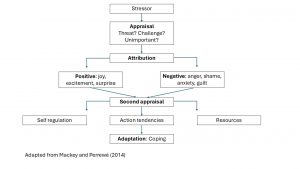
Carer stress and how coaching can help
What is stress?
One way to understand stress is as ‘overload’. When things are too much, our capacity to cope becomes diminished. It’s also important to recognise that what might be a stressor for one person may not register as stressful for another. How we evaluate stress makes a difference to what we experience as stressful. For example, you might find a noisy crowded environment incredibly stressful and come home with a headache, another person might find it quite exciting.
If stress is about perception, it’s also about how we react to that perception. In a stressful situation the body releases adrenaline as an immediate stress reaction, and cortisol is released after a prolonged period of stress (Grief and Palmer, 2022). Prolonged stress has a profound impact on our psychological and physical wellbeing.
Mackey and Perrewé (2014) developed the AAA model to describe what happens during stress reactions (Appraisal, Attribution, Adaptation):

In this model the primary appraisal stage determines how individuals will react to stress, and the emotions that come with this appraisal impact on how well-placed a person feels to cope or emotionally self-regulate.
What Is carer stress?
Many stress models are based on work conditions and job demands. However, carers experience stress differently. For instance, Grief and Palmer talk about work stress being managed by detaching oneself from that stress (a bit like walking out of the office at the end of the day) – this is not possible for carers. Hastings’ study (2003) found that stress affected parents differently: mothers were more likely than fathers to be impacted by stress due to their child’s behaviour.
Mothers of autistic children are more likely to experience stress if a child is emotionally distressed or struggles with emotional regulation (Brown, 2021; Higgins, Mannion, Chen, Leader, 2023) (this is often framed as children’s behavioural problems within studies). Parental stress also impacts on the child too (Brown, 2021). This means that stress can become embedded in the family a feedback loop.
How can coaching help with stress?
As a helping space designed to focus on you, coaching can support you to manage stress in a number of ways:
